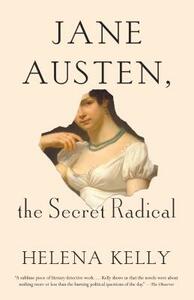Take a photo of a barcode or cover
THIS FUCKING BOOK. ALL THE EYEROLLS.
Originally I gave it 2 stars, but after ruminating on it I had to knock it down to 1 star for the author’s sheer audacity because in her mind the only one person to have ever read Jane Austen correctly is herself.
*hello eye roll, my old friend*
It is as if she imagines herself to be the only person who has ever contemplated Jane’s writing before, and the few critics she does acknowledge are swiftly swept aside, sometimes only in a footnote!
Spoiler alert for some of the STUPID suggestions the author puts forward about Jane and her writing, which are new to me, and ridiculous:
• Jane Austen’s family literally killed her.
• Fanny Price’s father physically/sexually(?) assaulted his children, thus Fanny’s sister’s arguing over the little silver knife, which they used as protection against him
• Mr. Knightly doesn’t actually love Emma, he only wants control over Hartford, so that he can enforce more enclosures of the land.
• Wickham is Darcy and Georgiana’s half-brother, and he was never trying to marry her, just trying get in good with the family.
• Harriet Smith and Jane Fairfax are half-sisters.
• Catherine Moreland is masturbating, not opening a cabinet. “Let’s not mince words here. With all its folds and cavities, the key, the fingers, the fluttering and trembling, this looks a lot like a thinly veiled description of female masturbation.”
Spoiler alert for some of the OBVIOUS suggestions the author puts forward about Jane and her writing, which are not new at all, although she claims them to be:
• Mansfield Park is full of slavery!
• Sense and Sensibility is about primogeniture!
Furthermore, the snarkiness and disrespect to other critics and Janeites was insane. For example, one passage in the book: ”Slavery wasn’t some distant, abstract notice for Jane. Her own family has ties to the Caribbean. Her eldest brother James, has a slave owning grandfather, James Nibbs, an Oxford acquaintance of the Reverend George Austen” leads to the following footnote: “The biography Claire Tomlin includes this information in an appendix about attitudes to slavery, almost as if she thinks the issue doesn’t really have anything to do with Jane or her writing.”
So yeah, REALLY annoyed I actually bought this book (hardcovers are expensive y’all!) with the hope I would learn something interesting about Jane’s works. UG.
If you want to read an AMAZING book on Jane’s works, check out John Mullan’s [b:What Matters in Jane Austen?: Twenty Crucial Puzzles Solved|15793663|What Matters in Jane Austen? Twenty Crucial Puzzles Solved|John Mullan|https://images.gr-assets.com/books/1350952788s/15793663.jpg|19694832]
Originally I gave it 2 stars, but after ruminating on it I had to knock it down to 1 star for the author’s sheer audacity because in her mind the only one person to have ever read Jane Austen correctly is herself.
*hello eye roll, my old friend*
It is as if she imagines herself to be the only person who has ever contemplated Jane’s writing before, and the few critics she does acknowledge are swiftly swept aside, sometimes only in a footnote!
Spoiler alert for some of the STUPID suggestions the author puts forward about Jane and her writing, which are new to me, and ridiculous:
• Jane Austen’s family literally killed her.
• Fanny Price’s father physically/sexually(?) assaulted his children, thus Fanny’s sister’s arguing over the little silver knife, which they used as protection against him
• Mr. Knightly doesn’t actually love Emma, he only wants control over Hartford, so that he can enforce more enclosures of the land.
• Wickham is Darcy and Georgiana’s half-brother, and he was never trying to marry her, just trying get in good with the family.
• Harriet Smith and Jane Fairfax are half-sisters.
• Catherine Moreland is masturbating, not opening a cabinet. “Let’s not mince words here. With all its folds and cavities, the key, the fingers, the fluttering and trembling, this looks a lot like a thinly veiled description of female masturbation.”
Spoiler alert for some of the OBVIOUS suggestions the author puts forward about Jane and her writing, which are not new at all, although she claims them to be:
• Mansfield Park is full of slavery!
• Sense and Sensibility is about primogeniture!
Furthermore, the snarkiness and disrespect to other critics and Janeites was insane. For example, one passage in the book: ”Slavery wasn’t some distant, abstract notice for Jane. Her own family has ties to the Caribbean. Her eldest brother James, has a slave owning grandfather, James Nibbs, an Oxford acquaintance of the Reverend George Austen” leads to the following footnote: “The biography Claire Tomlin includes this information in an appendix about attitudes to slavery, almost as if she thinks the issue doesn’t really have anything to do with Jane or her writing.”
So yeah, REALLY annoyed I actually bought this book (hardcovers are expensive y’all!) with the hope I would learn something interesting about Jane’s works. UG.
If you want to read an AMAZING book on Jane’s works, check out John Mullan’s [b:What Matters in Jane Austen?: Twenty Crucial Puzzles Solved|15793663|What Matters in Jane Austen? Twenty Crucial Puzzles Solved|John Mullan|https://images.gr-assets.com/books/1350952788s/15793663.jpg|19694832]
This book was exactly what I was hoping for--- a thorough explanation and background of what was going on when Jane Austen wrote each of her novels and the themes and ideas she was hinting at. Austen was not writing fluffy chick lit as many people seem to assume, but she was writing commentary on various events happening around her--- or in society standards. Slavery, Church of England, treatment of women, lack of heritage/money.....I was reassured that my favorite author was a radical and having her word--- when most women were not given that chance.
Reading this I feel like there was a lot I missed when I read the actual novels, so I hope to soon go back and read each novel and pull out the chapter of this book to see if I agree with Kelly's observations. The ultimate dream would be to go to Bath and Chawton, explore the coast of Lyme and read her works, but I am not part of Darcy's family, so I don't think I'll be doing that any time soon.
If you are a fan of Austen's work, I do recommend you read this (even if it can be a bit academic at times) to get a better understanding of Austen's time and her possible motivations behind different characters, their names....the vocabulary she chose.
Read if you find yourself arguing that Austen was a rule breaker. She was not one to just sit and be silent as many imagine. And her books were not just 'fluff'.
Reading this I feel like there was a lot I missed when I read the actual novels, so I hope to soon go back and read each novel and pull out the chapter of this book to see if I agree with Kelly's observations. The ultimate dream would be to go to Bath and Chawton, explore the coast of Lyme and read her works, but I am not part of Darcy's family, so I don't think I'll be doing that any time soon.
If you are a fan of Austen's work, I do recommend you read this (even if it can be a bit academic at times) to get a better understanding of Austen's time and her possible motivations behind different characters, their names....the vocabulary she chose.
Read if you find yourself arguing that Austen was a rule breaker. She was not one to just sit and be silent as many imagine. And her books were not just 'fluff'.
challenging
informative
reflective
slow-paced
challenging
informative
reflective
slow-paced
informative
reflective
medium-paced
It was helpful to get a different perspective of Jane's works. I appreciate the research the author did on not only Jane but Jane's world and the entire history that impacted her writing. I love seeing the world through Jane's experiences and getting glimpses into the sides of her stories that aren't centered on romance.
informative
medium-paced
I just can't do it. There are too many good books to read to waste any more time on this one. There were points in the first chapter I agreed with, such as the fact that we know so little about Jane Austen and we can't really be sure how true the statements from her family were. But then Kelly smugly claims that she can figure Jane Austen out through her novels. She's forgetting one crucial fact about reading: A reader can never read a book without some measure of personal bias. Anything Kelly learns will be tainted by her own experience and beliefs.
She repeatedly refers to Austen as "Jane." Frank Churchill had something to say about that in Emma. It assumes a familiarity that just cannot exist 200 years after Austen's death.
There is nothing wrong with recognizing the romance in Austen's books, as long as you pay attention to the other themes, too. I'm afraid Kelly was so focused on reading between the lines, she forgot to read the lines themselves. Bear in mind that anything she sets forth in this book is opinion, not fact.
Instead of finishing, I think I'll just reread Jane Austen's novels critically for myself and enjoy what they personally mean to me.
She repeatedly refers to Austen as "Jane." Frank Churchill had something to say about that in Emma. It assumes a familiarity that just cannot exist 200 years after Austen's death.
There is nothing wrong with recognizing the romance in Austen's books, as long as you pay attention to the other themes, too. I'm afraid Kelly was so focused on reading between the lines, she forgot to read the lines themselves. Bear in mind that anything she sets forth in this book is opinion, not fact.
Instead of finishing, I think I'll just reread Jane Austen's novels critically for myself and enjoy what they personally mean to me.
challenging
informative
fast-paced
I did learn a lot from this book, but I noticed a couple of facts she got wrong, and a few of her conclusions relied on too much conjecture.
Graphic: Death, Death of parent
Moderate: Slavery, Violence
Minor: Rape, Sexual assault, Sexual violence
informative
inspiring
reflective





